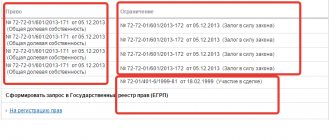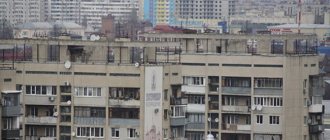Managing partner of Metrium Group Maria Litinetskaya answers:
In order to protect yourself as much as possible when buying real estate, you should ask the seller:
- certificate of state registration of rights and other title documents (sale or inheritance agreement, donation, privatization, etc.);
- extract from the Unified State Register;
- an extract from the house register about the absence of registered residents, which can be obtained at any MFC. This document confirms that all persons who previously lived in the apartment have been deregistered;
- a debt certificate from the MFC confirming the presence of debts on utility bills;
- a certificate from a narcological and psychoneurological dispensary.
Using an extract from the Unified State Register, the buyer can find out whether the seller really is the owner of the apartment. In this case, you can order both a “simple” statement and an extended version. In the second case, in addition to the last name, first name and patronymic, information about title documents or the “history” of the apartment from the moment of the first entry about it in the unified state register is provided. Relatively speaking, this document will make it possible to understand who previously owned this apartment and how often it was sold.
When checking an apartment, you should not limit yourself only to an extract from the Unified State Register. It is imperative to pay attention to the following points. Often apartments are sold by proxy, and the owner takes virtually no part in the transaction. Such objects can be classified as a risky category, because very often such powers of attorney are obtained fraudulently. In this case, the buyer can play it safe by getting the contact of the direct owner of the property from a trusted person, and then contact him to confirm the fact of the sale of the apartment. Or, for example, an apartment is put up for sale immediately after inheritance. In this case, it is better to be careful, because the possibility of new heirs cannot be ruled out, who, by law, have the right to challenge the purchase and sale of inherited real estate in court within three years. In addition, the apartment may have undischarged tenants or the housing may be owned by several people. In the extract from the Unified State Register, you need to pay special attention to the “Encumbrance” column. It indicates whether the apartment is mortgaged. It happens that the default on the mortgage amounts to a meager amount, and then the seller can pay off the debt from the deposit paid by the buyer, which will allow both parties to complete the transaction with peace of mind.
Unfortunately, even if you have checked the legal purity according to all the rules, there is always a possibility that you will lose the property. For example, if a citizen can prove that his rights were infringed during the sale of an apartment, now yours. Moreover, you may have to deal not with the seller, but with the owner who owned the apartment before him.
Finding out about privatization is easy
Before transferring a deposit for an apartment, check whether the person acting as the seller has the right to alienate the property and transfer it to the disposal of the new owner.
Only the owner has the right to dispose of housing, but in the absence of privatization and living in the living space within the framework of social rent, the municipality or the state is considered the owner. In such a situation, there can be no talk of legal re-registration under the purchase and sale agreement.
You should not trust sellers and realtors who represent their interests without supporting documentation, because it is easy to become a victim of fraud and transfer the deposit to people who do not have any rights to the property of interest.
There are many ways to find out who the apartment is privatized for:
- BTI;
- receipts for housing and communal services;
- Registration Chamber or MFC;
- Using specialized Internet resources.
Thanks to the privatization law no. 1541-1, since 1991, citizens have had the opportunity to convert the housing in which they lived into personal ownership. This gave the right to legally own and dispose of one’s property, bequeathing and donating it to loved ones and relatives, as well as exchanging and transferring it on paid terms to others.
Before completing a real estate transaction, it is in the interests of the parties to make sure that the housing is not the property of the state or municipality.
Sometimes it is enough to look at the housing and communal services receipt to determine the status of the property. In other cases, when documentary evidence of a fact is needed, they contact the BTI or Rosreestr (depending on the year when the housing was re-registered as property).
Who needs information?
Clarification of the status of residential premises is necessary for citizens who become its owners in return for their departed relatives.
Those persons who purchase an apartment to find out whether the rights of anyone previously registered in it have been violated.
Founder and CEO Igor Kalganov answers:
It’s quite easy to check an apartment yourself before purchasing it. It is necessary, with the help of the current owner of the apartment, to obtain basic documents confirming the absence of legal and other risks when purchasing real estate (the owner personally receives the documents or entrusts these actions to a representative by proxy).
List of documents required to verify real estate:
- technical, cadastral passport, floor plan, explication of the property (allows you to check the exact area of the apartment, as well as the presence of uncoordinated redevelopments);
- extract from the Unified State Register of Real Estate (to check the absence of encumbrances);
- an extract from the Unified State Register of Rights to the property (to track the entire chain of apartment owners);
- extract from the house register (obtaining information about persons registered in the apartment at the moment);
- certificate from the passport office in form 9 (extended, archival) - to obtain information about all persons registered in the apartment, as well as about the absence of temporarily discharged persons;
- a copy of the financial and personal account, a certificate from all utilities and household services about the absence of debt for utility services.
Documents under clauses 1-3 can be obtained from the “Unified Center for Public Services”. According to clauses 4 and 5, you must contact government service centers, passport offices or the management company at the location of the property.
The lawyer of the managing real estate agency "Agency.net" Igor Polsky answers:
Protecting yourself on your own without involving a lawyer is a task that is only partially feasible if the object initially has a good history and the counterparty is not faced with the task of misleading the other party. But everyone can check the main points and understand in time that the property is not worth buying.
Current market trends are such that most sellers do not want to show documents for an apartment until they receive an advance payment for a future transaction. But it is impossible to hide the exact address of the apartment, and when viewing the property, it is enough to remember the apartment number. The rest of the information is in the ad. At the apartment address, anyone can order an extract from the Unified State Register through the MFC or Rosreestr authorities. This statement contains most of the data that is needed for the initial verification of the object. If everything in the statement is “clean”, and the owners have confirmed their identity with a passport (the passport can also be checked on the FMS website), you can safely make an advance payment.
After making an advance payment, you receive all the necessary documents for a more in-depth inspection of the property you are purchasing. Using an extract from the house register and an extract from the financial and personal account, you can see all the residents registered in the apartment, as well as whether the property has debts on utility bills. If you have information about the owner, you also have the right to check for the presence of legal disputes and enforcement proceedings in relation to the property or the owner himself. This is done through government information resources. If after all the checks nothing suspicious is found, and the history of the object does not contain questionable transfers of rights, then in 99% of cases the object can be purchased.
When selling an apartment, the owner in the vast majority of cases knows the history of his property and how legally clean it is. The stumbling block is the settlement between the parties to the transaction. There are several payment methods: letter of credit, individual bank safe, cash payment upon signing the alienation agreement. As for the latter, it is not safe for the buyer, since the risk of giving away money and not waiting for the transfer of rights in favor of the buyer is extremely high. Payments through a bank are much safer, but it is important to pay attention to what is the condition for accessing money. This determines who retains the key in case of settlements through the depository, and at what point a receipt is written confirming the receipt of funds for the sale of the property.
Dmitry Baryshnikov, executive director of the consultancy, answers:
First, you should find out the history of the apartment that has been selected for purchase. This can be done by requesting an extract from the Unified State Register of Rights to Real Estate and Transactions with It (USRP). This extract indicates cases of seizure, existing restrictions on the disposal of property, etc. Russian legislation establishes a general limitation period of three years, so it is necessary to monitor whether any conflict situations related to this living space occurred during this period. A serious risk factor is that the apartment has changed owners several times, especially if the transactions took place by proxy.
Checking the legal cleanliness of the apartment
Legal verification of an apartment, verification of an apartment upon purchase, verification of legal risks when purchasing an apartment, verification of title documents and the history of the apartment, verification of the rights of third parties, the legal status of the owners of the apartment, examination of the purchase and sale agreement
It is imperative to check the legal purity of the apartment, even if you have no reason to doubt the purity of the transaction. It is necessary to carefully study the entire history of the apartment, check all previous transactions for this apartment, previous and current owners and their relatives, in order to exclude any cases of infringement of the rights of third parties that may challenge the legality of the transaction in the future. Contact a qualified and experienced lawyer to check the cleanliness of the apartment and do not risk the apartment and your money.
The following are cases when it is necessary to conduct a legal verification of documents for an apartment and legal support for the purchase and sale of an apartment:
- The owner of the apartment was convicted and deregistered. After returning from a place of imprisonment, having discovered the fact of privatization and sale of his apartment, he has the right to file a lawsuit to declare the transaction invalid and to reclaim it from someone else’s illegal possession.
- The owner of the apartment did not live in the apartment for a long time due to a business trip to another city/country or military service.
- The owner or one of the owners of the apartment is registered in a psychoneurological or drug treatment clinic. Many scammers operate according to this scenario and make money from it. The owner of the apartment, after selling it, declares that he was in a state of drug intoxication or was completely unaware of his actions, and goes to court with a claim to declare the sale of the apartment invalid. Then these persons, having spent all the money and returned the apartment through the court, will, by court decision, return the entire amount to the buyer over many years.
- may be placed in the form of a lien or a lien . The apartment seller may hide this information from you.
- It is necessary to conduct an examination of the legality of the privatization of the apartment . There are many cases when, before or at the time of privatization, minor children registered in an apartment were not allocated a share in the apartment. Until 1994, minor children were not included in the number of owners, but starting in 1994, the Supreme Court recognized these actions as contrary to the Constitution and ordered that minor children be included in the number of owners. In practice, there are quite a lot of cases when such children, having become adults, go to court for the allocation of a share in an apartment and win such cases, in particular, because in such cases no statute of limitations has been established.
- Checking for the presence of heirs (by law, without a will) through the authorities of the Ministry of Internal Affairs. In the situation with a female testator, no difficulties arise, since, as a rule, the children remain with the mother and are easy to identify. If the testator is a man, then in addition to his widow and their children, the man may also have children in other cities and countries, the existence of which no one may know. The maximum limitation period is 10 years, but it can be extended by court decision. For example, if one of the heirs was 2 years old at the time of the sale of the apartment and no one knew about the fact of his existence, then having reached the age of majority, he can apply to the court with a demand to declare the transaction invalid. Accordingly, the limitation period in this case may be 18 years.
- Cases when the former owner does not want to leave the apartment and creates obstacles for the new owners to move into the apartment. In this case, you need to involve a lawyer and contact the bailiff service.
- Checking the owner's legal capacity in full. Even if you have no suspicions and the seller seems quite adequate to you, you must ask him to undergo a test at a psychoneurological or drug treatment clinic. This way you will protect yourself and possibly avoid problems in the future.
- Checking the history of the apartment for the presence of refusals to participate in privatization. During privatization, the responsible tenant or any member of his family has the right to refuse the privatized apartment in favor of other relatives. According to the legislation of the Russian Federation, this “refusenik” retains the right to use the apartment on an indefinite basis (that is, he has the right to use the apartment even if it is sold, exchanged or donated). It is necessary to carefully check the history of the privatized apartment in order to avoid unpleasant consequences and subsequent disputes with strangers.
Ways to obtain information
How to find out whether an apartment is privatized or not? The apartment privatization transaction is a strictly regulated process, therefore information about it is contained in the relevant government organizations.
It is after contacting them that a citizen can receive information about the privatization of an apartment. Where can I find out whether an apartment is privatized or not?
Find out on our website about where to start the process of privatizing an apartment, to whom it is better to privatize it, how to correctly draw up an application and power of attorney for privatization, as well as refusal to participate in the procedure.
Look at the receipt
If you already live in an apartment or are moving into it after the death of a relative, study the receipt for payment of housing and communal services . You can navigate the status using the corresponding columns in the receipts.
How to find out whether an apartment is privatized or not based on the receipt?
In a privatized apartment, the owners pay a fee for the maintenance of common property . This type of payment is called “Maintenance of housing stock.” If the receipt for payment of housing and communal services contains such an accrual, it means that the apartment has already been privatized.
You can learn about the features of privatizing an apartment through an MFC or a realtor from our articles.
Request to Rosreestr
How to check whether an apartment has been privatized through Rosreestr?
All transactions made with real estate are registered in the Unified State Register or Rosreestr, so it is from these organizations that you can obtain reliable information about the status of the property.
You can contact this organization in person or online. Any citizen can obtain information by presenting his passport and paying a state fee from 200 to 600 rubles.
An individual will need to write an application and submit it to the organization along with a passport and a receipt for payment of the state fee.
A private organization needs to collect a package of documents consisting of the following items:
- constituent documents;
- extract from the Unified Register of Legal Entities;
- certificate of assignment of TIN;
- power of attorney from a citizen whose interests are represented by the organization.
How to find out whether an apartment is privatized or not by address via the Internet?
Through the Internet
How to find out whether an apartment is privatized or not via the Internet? If a citizen interested in this issue does not have time to visit the organization, you can use the Internet or send a request by mail.
To obtain the document, you need to go to the organization’s website and complete the following steps:
Select the desired option for receiving the finished document and enter the address.
“Customer Information” window .
Make a mark indicating consent to the processing of personal data.
- Attach copies of the required documents.
- Submit data for processing.
Receive a payment code by email.
- Make a payment using the code. The money must arrive in the organization’s account within 10 days.
- owners of the property and their authorized representatives;
- heirs by law or will;
- judicial or law enforcement agencies;
- authorities having jurisdiction over these objects;
- tax and statistical services.
After completing these formalities, you will receive a certificate about the type of rights to a specific object , as well as about claims and encumbrances relating to it. The information is provided in the form of a link that is sent to the interested person’s email.
It is impossible to obtain information about the status of the premises interactively, without obtaining official access. In addition to confirming personal data, the user must receive a paid (from 250 rubles) access key .
How to check whether an apartment is privatized or not through the MFC? Contacting the single window service is an alternative to obtaining information through Rosreestr. This organization is an intermediary between individual structures and citizens, so an extract from the Unified State Register can be obtained through it.
As in the previous case, the certificate-extract is a paid service . For individuals the cost is 200 rubles, for legal entities – 600 rubles. Any person who has a reason to do so can receive an extract.
This is interesting: Do Russians need a foreign passport to Moldova: its validity period for a successful trip, and will it be needed for children and when will they have to apply for a residence permit?
At the MFC you need to write an application, attach a receipt for payment of the state fee and present your passport. Legal entities will need to provide the same package of documents as when applying to Rosreestr.
The document processing time is 3-5 days . After this time, you will need to come to the organization in person and pick it up.
Contacting the BTI
How to find out whether an apartment has been privatized in the BTI? If the privatization of the apartment was carried out before 1998 , then information can be obtained exclusively through the BTI.
It was this organization that at that time dealt with issues of registration of real estate transactions.
Unlike the Unified State Register or Rosreestr, this organization does not provide information to all citizens who apply, but only to those who have legal grounds for this. The following persons can obtain a certificate about the object:
The procedure for issuing a certificate depends on which territorial office the citizen applies to, so there is no deadline for registration. In this regard, it is impossible to name the exact price of document execution.
How to find out about the privatization of an apartment at the address? This method of obtaining information is acceptable if there is no need to have an official document. A citizen can contact the settlement and information center . True, the law prohibits providing such information to everyone.
But employees of these organizations report them, contrary to the ban. The information will be accurate, although not official . This method is usually used by people living in an apartment and thinking about privatizing it. Before starting the process, it is worth making sure that the housing is indeed municipal .
Thus, you can obtain information about whether a specific apartment has been privatized in different ways. Depending on the purpose of receiving them, each person can choose the most suitable one for him.
Didn't find the answer to your question? Find out how to solve exactly your problem - call right now:
Cost of services
The cost of checking the legal cleanliness of an apartment by a lawyer ranges from 20,000 rubles .
The price includes the following services:
- Legal consultation
- Obtaining title documents and their examination
- Receiving documents from the BTI
- Obtaining an extract from the Unified State Register
- Preparation of a power of attorney to receive documents from government agencies and subsequent receipt of finished documents (including an archival extract from the house register and a copy of the financial and personal account)
- Checking the rights of third parties and the legal status of apartment owners
- Preparation of a conclusion based on the results of the audit with information on identified legal risks and ways to minimize them, as well as recommendations regarding the advisability of purchasing the specified apartment, taking into account the identified risks.
How to find out whether an apartment is privatized or not
Everyone dreams of having their own living space. An apartment for which ownership has been registered can be renovated to your taste and even remodeled. Such real estate is given or exchanged. There are no legal restrictions on making transactions with it. But many Russian citizens live in apartments under the social rental program.
Some Russians do not even suspect that living space can be privatized.
The first time the word privatization was heard was about 25 years ago. In those days, citizens were in no hurry to take advantage of this opportunity.
Modern realities are such that everyone living in apartments under the social rental program wants to become property owners.
To do this, you need to stand in line for privatization at the local administration. For now this procedure is free, but the situation may soon change. Those who have decided to take such an action need to collect a package of documents in order to privatize their housing. But, first of all, you should find out whether the apartment at the address is privatized. If yes, then time preparing documents and going through authorities will be wasted.
How to find out if an apartment at an address is privatized?
Finding out about the issue of privatization if you have an address or information about the people assigned to the apartment is quite simple.
To do this, you just need to contact the settlement center. It would seem that it is simpler, but there are nuances here. There is similar information in this service, but in fact it is prohibited to provide it. In practice, this rule is ignored and data is given. In general, it is not difficult to obtain data, but it will be illegal, although accurate.
To summarize, we can say that there are many ways to find out about the issue of privatization. The best way would be to contact Rosreestr, where you can get not only detailed information, but also relevant documents. Well, if you don’t need documents, then it’s even easier to do it.
This is interesting: My husband left me without money. How to feed a child
ATTENTION! Due to recent changes in legislation, the legal information in this article may be out of date!
Our lawyer will advise you free of charge.
Free legal support by phone:
Who has the right to know?
How to understand whether an apartment is privatized or not, and to whom is such information provided?
There are rules prescribed in the privatization legislation that regulate the list of persons who have the opportunity to familiarize themselves with such information. The direct tenant of social housing has the right to establish the fact that privatization has been carried out or not carried out in the occupied apartment.
The administration that allocated this housing has the ability to raise such information and clarify whether the property has been privatized. In some cases, when there is a violation of the law, representatives of law enforcement agencies may study the privatization documentation. Other categories of citizens do not have the right to receive information of this kind.
Who has the right to know
Not everyone can receive apartment privatization status. The legislation provides for the circle of persons to whom this information can be provided:
- Social housing tenants and their relatives.
- Administration allocated housing.
- In case of violation of the law on privatization of an apartment, law enforcement agencies may request information.
- Heirs of property.
- Tax authorities.
To obtain information, you must contact government organizations with a list of documents:
- Passport.
- Application in writing.
- A receipt confirming payment of the state duty.
When requesting information by a legal entity, the list of documents is wider:
- Passport of the representative of the organization and power of attorney.
- Statutory documents.
- Certificate confirming the legal functioning of the company.
- TIN.
- Extract from the Unified State Register of Legal Entities.
Where can I find out whether an apartment is privatized or not?
There are several authorities whose employees will provide reliable information about the status of the living space.
Through Rosreestr
Rosreestr manages data on the status of real estate, but not in full. They began to control the privatization process in 1998; there is no information before this period due to the devastation in the country.
This option should not be used as the only one.
Attention ! To apply to Rosreestr you will have to pay the state fee specified by law. duty. It is equal to 200 rubles. The payment receipt is attached to the written application.
The request to Rosreestr is drawn up in accordance with the approved template. You can ask for it from civil service employees. The application must be written strictly according to the sample. In addition, you will need a copy of your ID.
After submitting the above documents, you will have to wait 1-2 weeks.
At the end of the specified period, you can receive an extract from the register in person or arrange to have it sent by email.
How to find out whether an apartment has been privatized - contact Rosreestr or study the receipt for utilities.
According to payment document
In conditions of limited time, when there is no opportunity to wait for a response from Rosreestr, you can use a faster method.
Every month, apartment residents receive receipts to pay utility bills. At the top of the bills, before the calculation column, the type of real estate is indicated (whether it is privatized or not).
On a note! It is not recommended to rely too much on this method. In some cases, utility information has not changed for several years and the information may be out of date.
How to find out when an apartment is privatized? - this can be done through BTI.
BTI employees are also able to assist in providing information about the status of real estate. The BTI stores a large archive of information on the privatization of apartments.
You can personally visit this authority and, after filling out a written request, receive documentation confirming or refuting the status of privatization of the living space.
One of the easiest ways to obtain data proving that housing is privatized or, conversely, is in municipal ownership, is the address of the property. To do this, you need to visit the settlement center.
You must present a social rental agreement with the address of the residential property indicated in it. Based on the contract, the required information will be provided.
Using the Internet
How to find out whether an apartment is privatized or not via the Internet at an address? – it’s not difficult and won’t take much time. This option is suitable for those who do not have time to go through the authorities. An application to the Unified State Register can be submitted via the Internet.
Attention! You won't be able to get the information you need just like that.
You must have an electronic digital signature.
How to check if an apartment is privatized online? All you need to do is follow these steps:
- Visit the official website of the Unified State Register.
- Go to the services section and select the one you need.
- Fill out the form provided, leave a digital signature and submit your application.
Attention ! The form contains passport data, information about the rental of residential real estate, and characteristics of the housing about which information is requested.
A response to your request will be received within 30 days. Check your email periodically.
Through the Unified State Register
To obtain the required data from the Unified State Register, you should submit a request to the appropriate authority at your place of residence. In addition to providing details, you will need to pay a state fee. After this, an application is completed.
Each branch of the Unified State Register has its own rules for submitting a request; it is important to comply with all requirements.
With the completed application, Russian identity card, receipt of payment of the state duty, you need to visit the Unified State Register office. Information will be provided as soon as possible.
Recommendation: it is better not to delay the privatization of living space. The deadlines for free privatization of real estate have been extended by only 12 months.
The privatization procedure in our country has been going on for several years.
Many authorities do not have complete information on this issue. For those who are interested in: how to find out to whom the apartment was privatized, and when it was done, if the fact is confirmed, you can use one of the methods described above. It’s even better to use several options at once to eliminate the possibility of error. If it turns out that the property is not owned, you should immediately start privatizing it.
How to find out if an apartment has been privatized in Rosreestr
Interested in how to find out whether an apartment is privatized or not? The simplest, most convenient and reliable way is to request information from the Rosreestr service. This option can be used if one of two conditions is present:
- The housing was privatized after January 31, 1998 (the start date of the law on state registration of real estate).
- The apartment was registered as private property earlier than January 31, 1998, but after this date the apartment was the object of purchase and sale, gift, exchange, or was pledged or inherited.
In these cases, the Unified State Register of Real Estate Rights (USRE) must contain information about the residential premises itself, all its owners and their rights, as well as the presence or absence of encumbrances on property rights (mortgage, arrest, etc.).
Any citizen has the right to contact the Rosreestr unit and request information from the Unified State Register for a specific property. In this case it is necessary:
- present identification;
- write an application for the provision of information;
- pay a fee in the amount of 200 rubles. for each requested object.
Information regarding the object of interest will be provided in the form of an extract from the register. If it turns out that the Unified State Register does not have information about the apartment, it means that either it has not been privatized, or privatization took place before 1998, and no further transactions with the apartment were formalized.
Additional ways to find out if an apartment is privatized
In the period from 1991 to 1998. registration of privatization was entrusted to the BTI, so if there is reason to believe that privatization took place before 1998, then this service should be contacted for information. The BTI information base must contain information about all premises transferred to private ownership before the start of the Rosreestr service.
However, it should be noted that, in contrast to the information from the Unified State Register, information from the BTI is not provided to all interested parties. Only persons expressly listed in the law (the owner of the property, his heirs, courts, government bodies, statistics and some other institutions) have the right to receive such information.
When talking about how to find out whether an apartment has been privatized or not, we must mention another fairly simple method. The fact is that in receipts for payment for housing and communal services there is a term “Rent” or “Social Rent”. If the apartment is privately owned, then there are dashes in this line, since the owner does not pay for rent. If the apartment is not privatized, then this line indicates the accrued amount of payment under the social contract. hiring Therefore, if you have access to utility receipts for the past month, you can easily understand whether the home is privatized.
How to check the fact of privatization of an apartment using data from the register?
Good afternoon. The question is this. Our apartment was privatized back in 1979 in the center of St. Petersburg. There are documents on privatization. The apartment has 3 rooms. We privatized the apartment in equal shares for my wife, daughter and me. Today they said on TV that the privatization document is not yet sufficient and we need to make sure that the privatization of our apartment is in the register. Please tell me how to check this.
Dear Viktor Fedorovich. In order to check whether your apartment is registered in the cadastral register, you will need to contact the Office of the Federal Registration Service in your area with an application to provide you with a copy of the cadastral passport for the apartment. The cadastral passport will indicate the cadastral number assigned to your apartment. If this number is missing, this will mean that your apartment is not registered in the cadastral register. Then you will need to submit a separate application to register your apartment with the cadastral register. In general, a cadastral passport is necessary to determine the cadastral value of your apartment.
Poglazov Roman Viktorovich
Good afternoon. Privatization of housing in Russia has been carried out since 1991. Therefore your privatization date is probably wrong. It is also not clear from the question what you mean by the question “is the privatization of our apartment in the registry?” Are you interested in cadastral registration or registration of property rights? In any case, information about this can be obtained on the Rosreestr website at the link rosreestr.ru/wps/portal/online_request
Where to contact?
You shouldn’t go far if you don’t know how to find out whether an apartment has been privatized or not before you arrive.
Several government agencies may be happy to provide you with the information you are interested in. Today, the information exchange system is so developed that it is possible to clarify such a seemingly delicate issue even via the Internet.
That is why we decided to devote this article to ways to find out information about whether housing was once privatized or not.
Who has the right to know?
How to find out when the privatization of an apartment took place and who has the right to receive information about the privatization of a particular housing.
There are rules that are prescribed in the privatization law that regulate the procedure for persons who are given such information for review.
- You, as a direct tenant of social housing , have the right to establish whether privatization has taken place or not in the housing that you occupy.
- Members of the employer's family living directly with him also have the right to know whether such a procedure was carried out.
- Also, the administration that allocated this housing to you can raise similar information and clarify the fact of privatization.
- , law enforcement agencies may become familiar with privatization documents .
Additional ways to find out if an apartment is privatized
In the period from 1991 to 1998. registration of privatization was entrusted to the BTI, so if there is reason to believe that privatization took place before 1998, then this service should be contacted for information. The BTI information base must contain information about all premises transferred to private ownership before the start of the Rosreestr service.
However, it should be noted that, in contrast to the information from the Unified State Register, information from the BTI is not provided to all interested parties. Only persons expressly listed in the law (the owner of the property, his heirs, courts, government bodies, statistics and some other institutions) have the right to receive such information.
When talking about how to find out whether an apartment has been privatized or not, we must mention another fairly simple method. The fact is that in receipts for payment for housing and communal services there is a term “Rent” or “Social Rent”. If the apartment is privately owned, then there are dashes in this line, since the owner does not pay for rent. If the apartment is not privatized, then this line indicates the accrued amount of payment under the social contract. hiring Therefore, if you have access to utility receipts for the past month, you can easily understand whether the home is privatized.
You can find more complete information on the topic in ConsultantPlus. Full and free access to the system for 2 days.
Where can I find out?
Next, we’ll talk about where to find out whether an apartment is privatized or not and how to get the necessary information.
In Rosreestr
Rosreestr is the service that manages all the information about which housing was presented for privatization and which was not.
But it must be noted that this data is not contained in full. Until 1998, no one monitored the privatization process due to the devastation in the country.
Therefore, do not use this method of contact as the only one to obtain information.
To apply to Rosreestr, you must pay the state fee established by law. At the moment its cost is 200 rubles . You must attach a receipt for payment to your previously completed application.
The application must be drawn up in accordance with the established template, which you can request in advance from Rosreestr for review. Make a statement based on what is presented to you. Also don't forget to take a photocopy of your passport.
After submitting the entire package of documents, you will have to wait from one week to 15 days . After the expiration of the period, you can come for an extract from the register yourself, or agree in advance that it will be provided to you by mail or e-mail.
By receipt
If time does not allow you to wait a long time for the result from Rosreestr, you can choose a faster and easier method.
You receive receipts for utility bills every month. At the top, before the calculations, the type of housing (whether the apartment is privatized or not).
BTI can also help you get information about whether the apartment is privatized or not.
BTI has a huge archive of data on the privatization of certain residential premises.
Therefore, it will not be difficult for you to come to this body and, having filled out the appropriate written application , receive documents confirming or rejecting the privatization status of the apartment.
Of course, simple methods include obtaining information about privatization at the address. To do this, you should contact the settlement center.
You must provide your social tenancy agreement , which states the address of the premises. Based on it, you will be given all the necessary information.
Through the Internet
Those who just can’t find the time to get to any authority and find out the data on privatization are also incredibly lucky. These people can contact the Unified State Register via the Internet.
You need to go to the official website of the Unified State Register and in the services section and find the necessary one. Next, you will be asked to fill out the necessary form and submit a request.
In the form you indicate:
- Your passport details,
- Information about the rental of residential premises,
- As well as the characteristics of the real estate about which you are going to obtain information.
After this, you must leave your electronic signature and submit your request. Your form will receive a response within one month, so be sure to check your email regularly.
In order to obtain the necessary information from the Unified State Register, you just need to contact the relevant authority in your municipality.
Take the details and pay the mandatory state fee. After payment, fill out the application properly .
As a rule, each branch of the Unified State Register follows its own rules when drawing up an application, which means you must also comply with all the requirements necessary for this.
Fill out an application and, along with your passport as a citizen of the Russian Federation and a receipt for paid state duty, come to the Unified State Register office.
You will receive information shortly.
How to find out if an apartment has been privatized via the Internet
The procedure for obtaining information regarding the privatization of real estate with the help of government bodies takes a lot of time and in order to save it, it is possible to use operational data from unofficial channels.
For your information, any piece of real estate includes specific information that, one way or another, displays information about the owners.
Data you will need
Archival information can only be provided to those persons who have the legal right to do so or have compelling reasons.
The list of citizens is subject to approval by the state registration authority.
If there is a need to identify whether real estate is privatized or not, first of all, you can directly contact the official departments with the appropriate request.
How to draw up a sample application to the district police officer regarding noisy neighbors with links to the code, see the article: Application to the district police officer against noisy neighbors. How much does a technical passport for an apartment in BTI cost, read here.
In order to find out the relevant information, a request is formally generated showing the basis for the application.
The application must include:
- passport information;
- actual registration address of the potential applicant;
- other contact information for feedback as soon as possible.
In the case of privatization of real estate before 1998, the applicant will need to submit a corresponding request to the territorial BTI, whose responsibilities include registration of such transactions.
Where you can watch it for free at:
Initially, you need to remember that the only option to find out information regarding the existence of the fact of privatization of a particular property or its absence via the Internet is to apply by generating an electronic request to the Unified State Register or through the website of the Federal Registration Authority.
To be able to obtain the necessary information, you must have an electronic digital signature.
You can easily obtain it from the relevant government agency of any locality at your place of residence.
Other methods that are indicated on the Internet can be considered dubious and in most cases are used for advertising purposes.
In Rosreestr
It is impossible to find out the necessary information through the official portal of Rosreestr.
At the same time, it is necessary to pay attention to the availability of a special service on the website for individuals and legal entities in order to generate an appropriate request, which makes it possible to find a specific property by address.
The developed form requires knowledge of the conditional or cadastral number and other important information:
| The form is subject to mandatory certification | The electronic digital signature key of the direct applicant |
| It is necessary to make a payment of 150 rubles | Individuals and legal entities |
A receipt for payment of the state duty is generated as a link or as an attachment in an email.
In addition, to be able to use the service, you must obtain an electronic signature, the cost of which is at least 250 rubles.
In BTI
The territorial representative office of the BTI (Bureau of Technical Inventory) provides certificates (including copies) or information on property owners for the following categories of citizens:
| For property owners | Their authorized representatives, if they have a notarized power of attorney in writing |
| To legal successors (meaning heirs) | Who have the right to real estate under a previously drawn up will or on legal grounds |
| Law enforcement and judicial officials | Within the scope of paperwork where a specific property appears |
| State, municipal and other executive authority for real estate | Which is located in their jurisdiction |
| Representatives of tax and statistical services | As well as justice officials and other representatives authorized to receive information in accordance with the norms of Russian legislation |
BTI includes an archive of documentation regarding the process of privatization of residential premises in the period from 1991 to 1998.
At the same time, you need to remember that starting from January 1999, all necessary information regarding residential real estate must be entered into the Unified State Register of Rights - Unified State Register of Rights.










